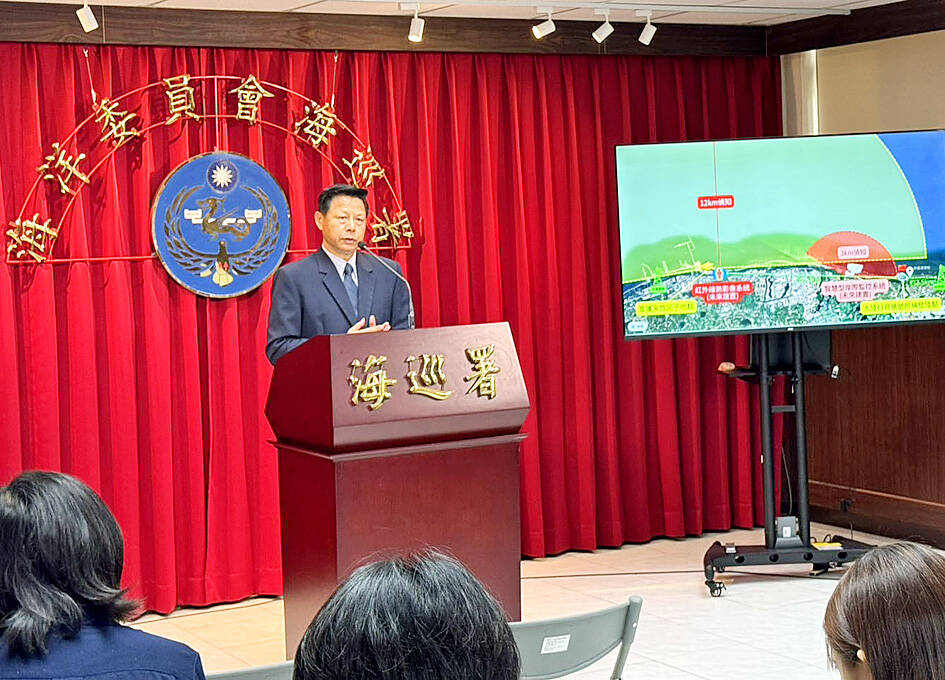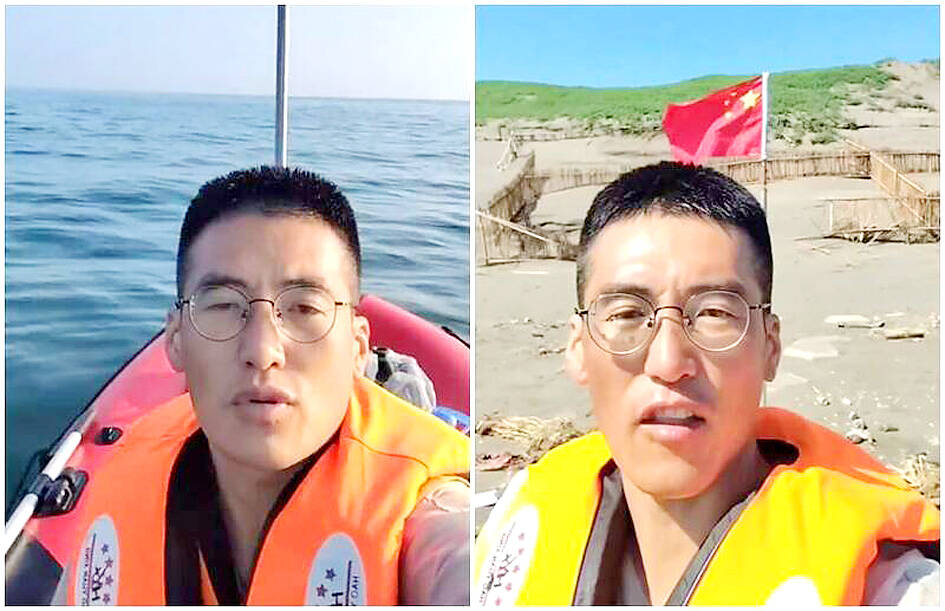China could try to disrupt public morale ahead of President William Lai’s (賴清德) one-year anniversary this week, the Coast Guard Administration (CGA) said yesterday, after images circulated on social media of a person planting a Chinese flag on a Taiwanese beach.
On Sunday, two videos posted on Chinese social media showed a man speaking with a Chinese accent claiming to have sailed across the Taiwan Strait on a small boat landing on a remote beach and planting a Chinese flag.
The man said that he sailed solo from a beach near Fuzhou Changle International Airport in China’s Fujian Province on Thursday, landed in Taiwan the same day, and then returned to China.

Photo: CNA
A GPS screenshot shown at the end of one video indicated a location along the coast of Taoyuan’s Dayuan District (大園), an area dotted with onshore wind turbines.
CGA Deputy Director-General Hsieh Ching-chin (謝慶欽) yesterday told a news conference that although a preliminary analysis had ruled out video forgery, the man did not appear dehydrated or sunburned — conditions typically expected after such a journey.
The CGA has requested assistance from the National Immigration Agency and the Ministry of National Defense, and is reviewing surveillance footage to verify whether the man actually entered Taiwan and whether he received any help inland.

Photo: screenshots from X
The videos, each less than 40 seconds long, had earlier appeared on Douyin (抖音), the Chinese version of TikTok, but were later removed.
The CGA said their removal does not affect its investigation.
On Friday, two Chinese nationals — a father and son — used a rubber dinghy to illegally enter a beach in Taoyuan’s Guanyin District (觀音), 10.9km from the site purportedly shown in the videos posted on Sunday. They were arrested shortly afterward.
Hsieh said that while both incidents were possible, the Guanyin case appeared more credible based on the claimed departure points and fuel amounts involved.
He also acknowledged that the small size of inflatable boats poses a challenge to radar detection and that limited staffing further complicates surveillance efforts.
The number of infrared thermal imaging cameras installed along Taiwan’s coast remains insufficient amid intensifying Chinese incursions, he added.
The CGA has sought additional funding to install more cameras and other surveillance equipment.
Citing China’s “Joint Sword-2024A” military exercise following Lai’s inauguration on May 20 last year, Hsieh said the recent illegal entry cases could be part of Beijing’s strategy to sow confusion in Taiwan around the anniversary of Lai’s first year in office.
So far this year, the CGA has documented five illegal entry cases involving 38 people. All but two were apprehended on site.
Hsieh emphasized the need for harsher penalties for illegal entry.
Under the Immigration Act (入出國及移民法) and the Act Governing Relations Between the People of the Taiwan Area and the Mainland Area (台灣地區與大陸地區人民 關係條例), those who enter Taiwan without authorization can be sentenced to up to five years in prison or fined up to NT$500,000.
However, offenders in so-called “quasi-smuggling” cases have typically received jail terms of no more than eight months or were only fined, Hsieh said.
In other developments, the CGA yesterday deployed patrol ships to repel more than 30 Chinese “three noes” fishing boats — no name, no registration, no flag — that entered the marine territory off Penghu County’s Cimei Island (七美島).
Penghu fishery crews yesterday morning reported sighting more than 30 trawlers suspected of coming from Chinese ports, about 36 nautical miles (66.7km) southwest of Cimei, heading in a northwest direction.
As the Chinese government is enforcing its offseason fishing ban off its coastal waters, it is unusual for such large numbers of fishing vessels to appear in the area, Penghu fishers said.
Additional reporting by Reuters and Liu Yu-ching

CHAOS: Iranians took to the streets playing celebratory music after reports of Khamenei’s death on Saturday, while mourners also gathered in Tehran yesterday Iranian Supreme Leader Ayatollah Ali Khamenei was killed in a major attack on Iran launched by Israel and the US, throwing the future of the Islamic republic into doubt and raising the risk of regional instability. Iranian state television and the state-run IRNA news agency announced the 86-year-old’s death early yesterday. US President Donald Trump said it gave Iranians their “greatest chance” to “take back” their country. The announcements came after a joint US and Israeli aerial bombardment that targeted Iranian military and governmental sites. Trump said the “heavy and pinpoint bombing” would continue through the week or as long

TRUST: The KMT said it respected the US’ timing and considerations, and hoped it would continue to honor its commitments to helping Taiwan bolster its defenses and deterrence US President Donald Trump is delaying a multibillion-dollar arms sale to Taiwan to ensure his visit to Beijing is successful, a New York Times report said. The weapons sales package has stalled in the US Department of State, the report said, citing US officials it did not identify. The White House has told agencies not to push forward ahead of Trump’s meeting with Chinese President Xi Jinping (習近平), it said. The two last month held a phone call to discuss trade and geopolitical flashpoints ahead of the summit. Xi raised the Taiwan issue and urged the US to handle arms sales to

BIG SPENDERS: Foreign investors bought the most Taiwan equities since 2005, signaling confidence that an AI boom would continue to benefit chipmakers Taiwan Semiconductor Manufacturing Co’s (TSMC, 台積電) market capitalization swelled to US$2 trillion for the first time following a 4.25 percent rally in its American depositary receipts (ADR) overnight, putting the world’s biggest contract chipmaker sixth on the list of the world’s biggest companies by market capitalization, just behind Amazon.com Inc. The site CompaniesMarketcap.com ranked TSMC ahead of Saudi Aramco and Meta Platforms Inc. The Taiwanese company’s ADRs on Tuesday surged to US$385.75 on the New York Stock Exchange, as strong demand for artificial intelligence (AI) applications led to chip supply constraints and boost revenue growth to record-breaking levels. Each TSMC ADR represents

Pro-democracy media tycoon Jimmy Lai’s (黎智英) fraud conviction and prison sentence were yesterday overturned by a Hong Kong court, in a surprise legal decision that comes soon after Lai was jailed for 20 years on a separate national security charge. Judges Jeremy Poon (潘兆初), Anthea Pang (彭寶琴) and Derek Pang (彭偉昌) said in the judgement that they allowed the appeal from Lai, and another defendant in the case, to proceed, as a lower court judge had “erred.” “The Court of Appeal gave them leave to appeal against their conviction, allowed their appeals, quashed the convictions and set aside the sentences,” the judges